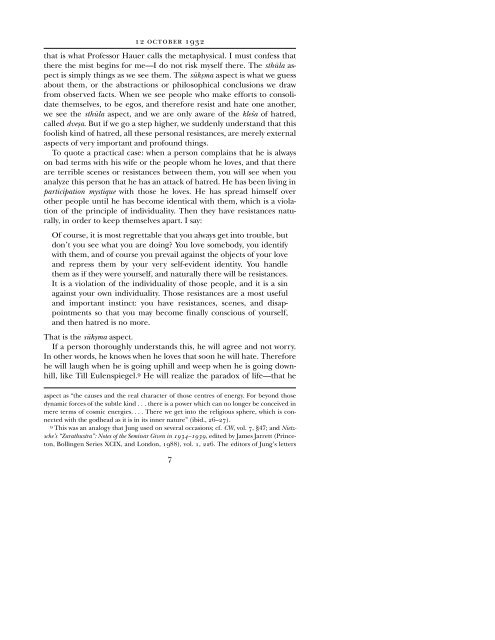CG JUNG - Countryside Anarchist
CG JUNG - Countryside Anarchist
CG JUNG - Countryside Anarchist
Create successful ePaper yourself
Turn your PDF publications into a flip-book with our unique Google optimized e-Paper software.
12 OCTOBER 1932<br />
that is what Professor Hauer calls the metaphysical. I must confess that<br />
there the mist begins for me—I do not risk myself there. The sthÖla aspect<br />
is simply things as we see them. The sÖküma aspect is what we guess<br />
about them, or the abstractions or philosophical conclusions we draw<br />
from observed facts. When we see people who make efforts to consolidate<br />
themselves, to be egos, and therefore resist and hate one another,<br />
we see the sthÖla aspect, and we are only aware of the kleça of hatred,<br />
called dveüa. But if we go a step higher, we suddenly understand that this<br />
foolish kind of hatred, all these personal resistances, are merely external<br />
aspects of very important and profound things.<br />
To quote a practical case: when a person complains that he is always<br />
on bad terms with his wife or the people whom he loves, and that there<br />
are terrible scenes or resistances between them, you will see when you<br />
analyze this person that he has an attack of hatred. He has been living in<br />
participation mystique with those he loves. He has spread himself over<br />
other people until he has become identical with them, which is a violation<br />
of the principle of individuality. Then they have resistances naturally,<br />
in order to keep themselves apart. I say:<br />
Of course, it is most regrettable that you always get into trouble, but<br />
don’t you see what you are doing? You love somebody, you identify<br />
with them, and of course you prevail against the objects of your love<br />
and repress them by your very self-evident identity. You handle<br />
them as if they were yourself, and naturally there will be resistances.<br />
It is a violation of the individuality of those people, and it is a sin<br />
against your own individuality. Those resistances are a most useful<br />
and important instinct: you have resistances, scenes, and disappointments<br />
so that you may become finally conscious of yourself,<br />
andthenhatredisnomore.<br />
ThatisthesÖküma aspect.<br />
If a person thoroughly understands this, he will agree and not worry.<br />
In other words, he knows when he loves that soon he will hate. Therefore<br />
he will laugh when he is going uphill and weep when he is going downhill,<br />
like Till Eulenspiegel. 9 He will realize the paradox of life—that he<br />
aspect as “the causes and the real character of those centres of energy. For beyond those<br />
dynamic forces of the subtle kind . . . there is a power which can no longer be conceived in<br />
mere terms of cosmic energies. . . . There we get into the religious sphere, which is connected<br />
with the godhead as it is in its inner nature” (ibid., 26–27).<br />
9 This was an analogy that Jung used on several occasions; cf. CW, vol. 7, §47; and Nietzsche’s<br />
“Zarathustra”: Notes of the Seminar Given in 1934–1939, edited by James Jarrett (Princeton,<br />
Bollingen Series XCIX, and London, 1988), vol. 1, 226. The editors of Jung’s letters<br />
7


